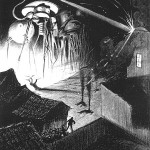Stories, even short, science-fiction stories, offer lessons beyond their pages.
Near the final pages of Wells’s War of the Worlds, the narrator ponders his future, months after the Martians succumbed on our world. He considers the possibility of another invasion:
A question of graver and universal interest is the possibility of another attack from the Martians. I do not think that nearly enough attention is being given to this aspect of the matter. At present the planet Mars is in conjunction, but with every return to opposition I, for one, anticipate a renewal of their adventure.
But as a leading scientist looks out into the skies, that scholar supposes that the Martians might have already begun a new campaign, not against Earth, but against Venus:
Lessing has advanced excellent reasons for supposing that the Martians have actually succeeded in effecting a landing on the planet Venus. Seven months ago now, Venus and Mars were in alignment with the sun; that is to say, Mars was in opposition from the point of view of an observer on Venus. Subsequently a peculiar luminous and sinuous marking appeared on the unillumined half of the inner planet, and almost simultaneously a faint dark mark of a similar sinuous character was detected upon a photograph of the Martian disk. One needs to see the drawings of these appearances in order to appreciate fully their remarkable resemblance in character.
The book ends without readers knowing with certainty whether the Martians went elsewhere, or whether they might attempt a second invasion of Earth. Humanity would be better off if they went somewhere else, if they were to go somewhere at all.
All is not lost, however, as the narrator wisely concludes. To be forewarned is to be forearmed:
In any case, we should be prepared. It seems to me that it should be possible to define the position of the gun from which the shots are discharged, to keep a sustained watch upon this part of the planet, and to anticipate the arrival of the next attack.
In that case the cylinder might be destroyed with dynamite or artillery before it was sufficiently cool for the Martians to emerge….It seems to me that they have lost a vast advantage in the failure of their first surprise. Possibly they see it in the same light.
I read this story as a child, and its hauntingly beautiful scenes have remained in my memory so many years later.
So, too, its hopeful message, not of creatures but of people: that having had a disappointing time of it, one may through that experience learn to act more skillfully and decisively should there be subsequent, similar challenges.
That’s why, despite the devastation of the Martians’ attack, I’ve always thought the book was a hopeful one, with an encouraging message.
One would have the advantage, and seize it to the fullest, the second time around.

